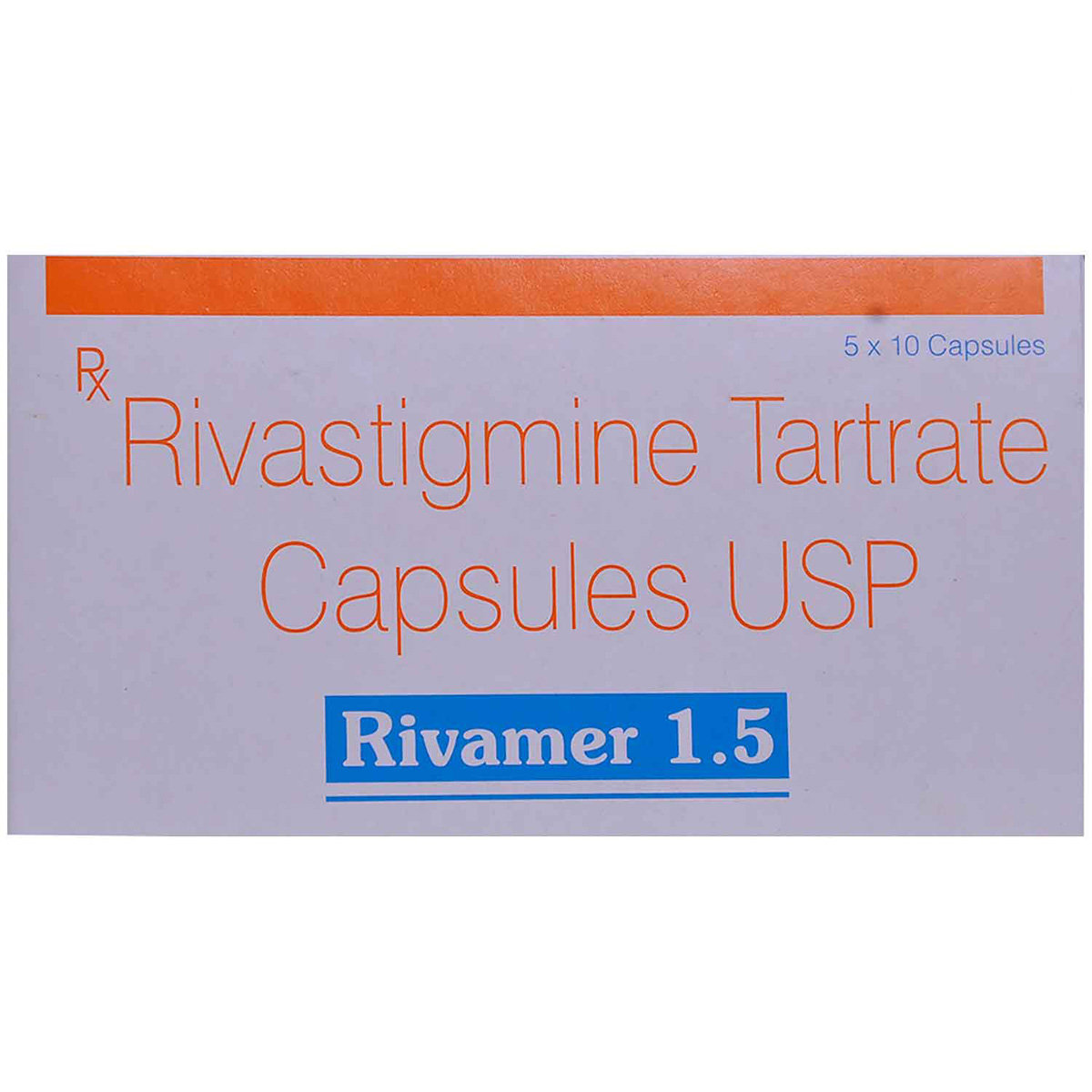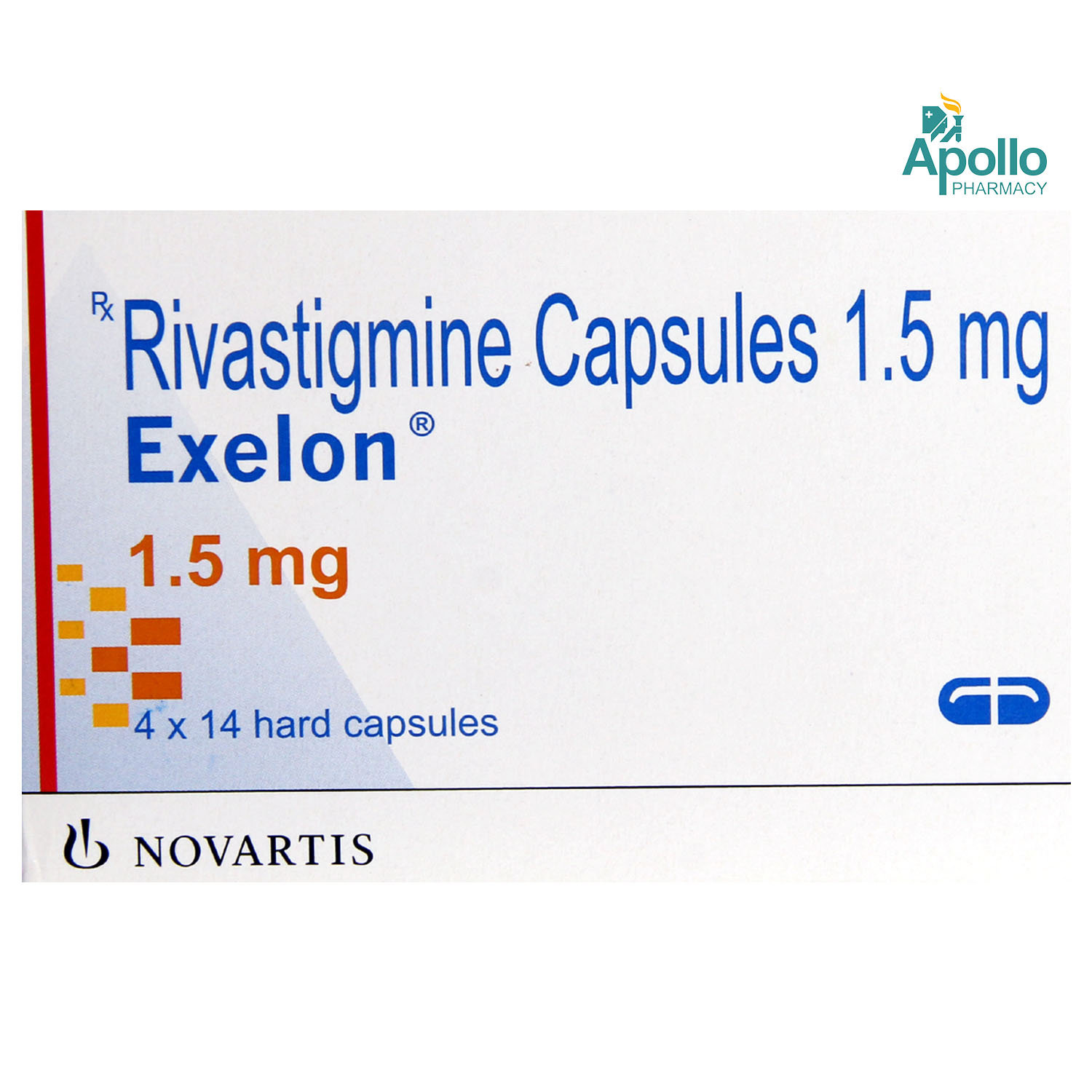- Home
- Rivastina 1.5mg Capsule
Rivastina 1.5mg Capsule Substitute
Rivastina 1.5mg Capsule Substitute
Medicine Composition:
RIVASTIGMINE-1.5MGAll Substitutes & Brand Comparisons
RX
Out of StockVastmin 1.5mg Capsule
Lifecare Neuro Products Ltd
₹85
(₹7.65 per unit)
18% COSTLIERRX
Out of StockRivagold 1.5mg Capsule
Septalyst Lifesciences Pvt Ltd
₹97
(₹8.73 per unit)
34% COSTLIERRX
Out of StockRivasure 1.5 Capsule 15's
Jagsam Pharma
₹225
(₹15.0 per unit)
131% COSTLIERRX
Rivamer 1.5 Capsule 10's
Sun Pharmaceutical Industries Ltd
₹197.5
(₹17.78 per unit)
174% COSTLIERRX
Rst-1.5 mg Capsule 10's
Dd Pharmaceuticals Ltd
₹187.5
(₹18.75 per unit)
189% COSTLIERRX
Exelon 1.5 mg Capsule 14's
Novartis India Ltd
₹744.5
(₹53.18 per unit)
720% COSTLIER

When Should You Consider Switching from Rivastina 1.5mg Capsule?
Patients may explore substitutes in the following scenarios:
- High monthly cost of Rivastina 1.5mg Capsule
- Non-availability in local pharmacies
- Generic recommendation by a doctor
- Side effects or better tolerability with alternatives
What to Know Before Switching
Before you switch from Rivastina 1.5mg Capsule to another medicine, here are some important points to keep in mind:
Same salt, different brands:
Most substitutes contain the same active ingredient - RIVASTIGMINE-1.5MG, but the fillers, coating, or manufacturing quality may vary slightly.
Consult your doctor first:
Even if the salt is the same, your doctor can confirm if the substitute is right for your condition, dosage, and health history.
Watch out for allergies or reactions:
Some people may react differently to certain brands due to inactive ingredients. If you notice any side effects, inform your doctor immediately.
Price ≠ effectiveness:
A lower-priced substitute doesn't mean it's less effective. Many generic medicines work just as well as branded ones.
Check the dosage form and strength:
Always match the substitute’s strength (e.g., 5mg, 10mg) and form (tablet, capsule, syrup) with what your doctor prescribed.
Uses
Rivastina 1.5mg Capsule is used in the treatment of mild to moderate dementia caused by Alzheimer's and Parkinson's disease. The detailed uses of Rivastina 1.5mg Capsule are as follows:
- Manages Alzheimer's Disease-Associated Dementia: Rivastina 1.5mg Capsule helps improve cognitive functions, such as memory, thinking, and awareness, in patients with Alzheimer's-related dementia by increasing acetylcholine levels in the brain.
- Manages Parkinson's Disease-Associated Dementia: Rivastina 1.5mg Capsule helps improve memory and mental clarity in patients with Parkinson's-related dementia by slowing the breakdown of acetylcholine in the brain.
- Delays Disease Progression: Rivastina 1.5mg Capsule may temporarily slow the worsening of dementia symptoms, helping to maintain overall mental function for a longer period.
Medicinal Benefits
Rivastina 1.5mg Capsule treats mild to moderate dementia caused by Alzheimer's and Parkinson's diseases. It contains 'Rivastigmine', an acetylcholinesterase inhibitor. Rivastigmine increases acetylcholine (a brain chemical) levels in the central nervous system involved in transmitting nerve signals that play an essential role in memory. Rivastina 1.5mg Capsule is not a cure for Alzheimer's and Parkinson's diseases, but it improves memory, thinking, awareness and the ability to perform daily functions.
FAQs
The substitutes of Rivastina 1.5mg Capsule contain the same active salt(s) - RIVASTIGMINE-1.5MG. However, they may differ in price, manufacturing quality, and inactive ingredients. Speak to your doctor to find a suitable option.
Switching to a generic substitute medicine in the place of Rivastina 1.5mg Capsule is often possible if it has the same salt, strength, and dosage form. But always check with your doctor before making any changes to your medication.
Generics versions of Rivastina 1.5mg Capsule are typically more affordable because they don’t include the original brand's research, development, and marketing costs. They contain the same active ingredient and are approved for safety and effectiveness.
Most people don’t notice any difference. However, some may react to different fillers or coatings. If you notice any unusual symptoms after switching, consult your doctor.
Make sure the new medicine has the same active salt, strength, dosage form. Always confirm the change with your doctor or pharmacist.
Substitutes of Rivastina 1.5mg Capsule meet the same safety and efficacy standards as Rivastina 1.5mg Capsule, but small differences in absorption or formulation can exist. A doctor can help you choose the right one for your needs.
Yes. Substitutes of Rivastina 1.5mg Capsule may vary in color, size, or shape due to differences in manufacturing and branding, but this does not affect how they work.
Yes, it’s generally safe to switch between multiple substitutes of Rivastina 1.5mg Capsule if they have the same salt and strength. However, always inform your doctor so they can monitor how your body responds.
Yes, many people safely use substitutes of Rivastina 1.5mg Capsule for long-term treatment. Just ensure it’s done under medical supervision.
If your symptoms stay under control or lab results remain stable, the substitute for Rivastina 1.5mg Capsule is likely working well. Regular follow-ups with your doctor are important.
Absolutely. Even with the same salt, small differences can affect how your body responds when switching from Rivastina 1.5mg Capsule to its substitute. Always consult your doctor before switching.
Rivastina 1.5mg Capsule is used to treat mild to moderate dementia caused by Alzheimer's or Parkinson's disease.
Rivastina 1.5mg Capsule contains 'Rivastigmine', an acetylcholinesterase inhibitor. It treats dementia in Alzheimer's and Parkinson's diseases by increasing acetylcholine levels in the central nervous system and enhancing the neurotransmission process. Thus, Rivastina 1.5mg Capsule improves memory, thinking and awareness.
Rivastina 1.5mg Capsule should be used with caution in the medical history of liver or kidney diseases, breathing problems (asthma, chronic obstructive pulmonary disease (COPD)), stomach/intestinal problems (ulcers, bleeding), heart diseases (sick sinus syndrome and other conduction disorders), fainting, fits, urination problems and enlarged prostate. Please let your doctor know if you have any other medical problems before starting Rivastina 1.5mg Capsule.
It is advised to take Rivastina 1.5mg Capsule with food to avoid any stomach upset. Please consult your doctor for more information.
Take the medicine as soon as possible. However, if it is time for the next dose, skip the missed dose and return to your regular dosing schedule.
Rivastina 1.5mg Capsule may cause side effects such as nausea, vomiting, dizziness, drowsiness, stomach upset, weakness, loss of appetite, tremor or slow heartbeat. If these side effects persist or worsen, please consult your doctor.
Rivastina 1.5mg Capsule may take up to 12 weeks to start working. Each person reacts differently to the medicine. The clinical benefits of Rivastina 1.5mg Capsule should be evaluated regularly. If the symptoms do not improve after 12 weeks of treatment, Rivastina 1.5mg Capsule should be stopped.
Rivastina 1.5mg Capsule should be taken as advised by the doctor. Usually, Rivastina 1.5mg Capsule is prescribed to be taken two times a day, in the morning and evening, with food. Swallow it as whole with a glass of water. Do not open, crush or chew it.
Yes, antacids can be taken with Rivastina 1.5mg Capsule as they do not interfere with the working of Rivastina 1.5mg Capsule. Additionally, some patients may experience increased acid secretion in the stomach. Therefore, your doctor may prescribe an antacid to relieve this acidity.
If you take more than the recommended doses of Rivastina 1.5mg Capsule, it may cause stomach pain, diarrhea, dizziness, headache, tremor, hallucinations, sleepiness, and malaise. Higher doses may also cause increased sweating, confusion, and an increase in blood pressure. In case you take an overdose of Rivastina 1.5mg Capsule, seek medical attention immediately.
Yes, Rivastina 1.5mg Capsule can cause drowsiness or sleepiness, especially at the beginning of treatment or when increasing the dose. If you feel dizzy or sleepy, avoid driving or using machines or performing any tasks that require your attention.
No, do not stop taking Rivastina 1.5mg Capsule without consulting your doctor. However, if treatment is stopped for more than three days, do not take Rivastina 1.5mg Capsule and consult your doctor. The doctor will restart the treatment with a low dosage twice daily. Then, the dose can be increased gradually as was done previously.
Yes, Rivastina 1.5mg Capsule can cause hallucinations. However, hallucinations are reported in very few people. Usually, it may occur shortly after dose increase.




